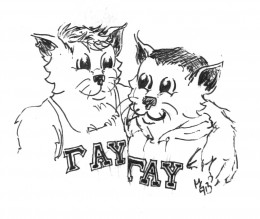
These are two words that don’t usually go together.
That’s why ‘Gay and Greek’ was a provocative name for a forum held this week by SHADES, a campus group which caters to LGBTQ students of color.
A few years ago, 12 students speaking openly about their experiences with homosexuality in Greek life would have been difficult to fathom. We also would have never imagined an active, professional athlete coming out as gay in a testosterone-heavy environment like pro-basketball, but that’s exactly what NBA player Jason Collins did this past week. This type of boundary breaking is progressive and we hope it represents a trajectory of breaking more stigmas surrounding sexuality.
Events like these reflect a departure from shallow conceptions which align gender and sexuality. We’re about ready to get past that whole heteronormativity thing; in other words, those ugly assumptions that being either a woman or a man brings with it distinct roles and limitations.
Still, as remarkable as these types of programs are, we’re hoping there will be a time when these conversations aren’t regarded as anything special.
Don’t get us wrong; the fact that groups and individuals are having these conversations is a good thing. These conversations have an instrumental role in the transitory period we are in, shifting from a culture of ignorance to one of tolerance, and addressing existing stigmas will pave the way toward a truly egalitarian future.
We know we’ll have reached our goal when out-and-proud athletes and fraternity brothers are taken for granted. We’ll have succeeded when it isn’t anything special for an athlete, frat brother, or anyone else for that matter, to come out and identify as queer.
That athletes and public figures feel more and more comfortable opening up about their sexuality symbolizes progress. But the fact that it still attracts national media attention when an athlete unexpectedly comes out shows how far we are from the goal.
Coming out, ideally, wouldn’t elicit any controversy or attention.
Greek life has the potential to play a significant role in the transition to a more egalitarian campus.
Greek organizations, particularly social fraternities and sororities, purport to have many goals and focuses. Joining a frat is supposed to be about more than easy opportunities to get with the opposite sex. If so much of what it means to be in a frat revolves around community service, brotherhood and networking, why shouldn’t gay men participate? And if the essence of a sorority is sisterhood, and not party-hood, what’s stopping openly gay women from enlisting? Also, why shouldn’t two frats of the same sex, or two sororities, mix?
In these senses, embracing the diversity of sexual orientations would be a good move for Greek life, too. Gay and lesbian brothers and sisters lend credibility to Greek life’s proclaimed philanthropic ideals. And in terms of expanding horizons and challenging the norm, it definitely wouldn’t hurt to mix it up a little bit — literally and figuratively.


